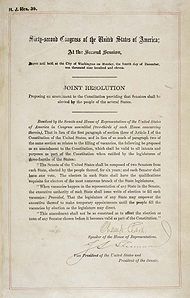| Online: | |
| Visits: | |
| Stories: |

| Story Views | |
| Now: | |
| Last Hour: | |
| Last 24 Hours: | |
| Total: | |
Today in 1913 The Seventeenth Amendment to The Us Constitution Went Into Effect
Saturday, May 31, 2014 5:13
% of readers think this story is Fact. Add your two cents.
May 31,1913 The 17th Amendment to the Constitution, providing for the popular election of U.S. senators, was declared in effect.
The Seventeenth Amendment (Amendment XVII) to the United States Constitution established direct election of United States Senators by popular vote. The amendment supersedes Article I, § 3, Clauses 1 and 2 of the Constitution, under which senators were elected by state legislatures. It also alters the procedure for filling vacancies in the Senate, allowing for state legislatures to permit their governors to make temporary appointments until a special election can be held. Under the original provisions of the Constitution, senators were elected by state legislatures; this was intended to prevent the federal government from indirectly absconding with the powers and funds of the states. However, over time various issues with these provisions, such as the risk of corruption and the potential for electoral deadlocks or a lack of representation should a seat become vacant, led to a campaign for reform.
Reformers introduced constitutional amendments in 1828, 1829, and 1855, with the issues finally reaching a head during the 1890s and 1900s. Progressives, such as William Jennings Bryan, called for reform to the way senators were chosen. Elihu Root and George Frisbie Hoar were prominent figures in the campaign to maintain the state legislative selection of senators. By 1910, 31 state legislatures had passed motions calling for reform. By 1912, 239 political parties at both the state and national level had pledged some form of direct election, and 33 states had introduced the use of direct primaries. With a campaign for a state-led constitutional amendment gaining strength, and a fear that this could result in a “runaway convention”, the proposal to mandate direct elections for the Senate was finally introduced in the Congress. It was passed by the Congress and, on May 13, 1912, was submitted to the states for ratification. By April 8, 1913, three-fourths of the states had ratified the proposed amendment, making it the Seventeenth Amendment. Secretary of State William Jennings Bryan formally declared the amendment’s adoption on May 31, 1913.
Critics of the Seventeenth Amendment claim that by altering the way senators are elected, the states lost any representation they had in the federal government and that, in addition to violating the unamendable state suffrage clause of Article V, this led to the gradual “slide into ignominy” of state legislatures, as well as an overextension of federal power and the rise of special interest groups to fill the power vacuum previously occupied by state legislatures.[1] In addition, concerns have been raised about the power of governors to appoint temporary replacements to fill vacant senate seats, both in terms of how this provision should be interpreted and whether it should be permitted at all. Accordingly, noted public figures have expressed a desire to reform or even repeal the Seventeenth Amendment.
Source: http://www.americanfreedombybarbara.com/2014/05/today-in-1913-seventeenth-amendment-to.html



